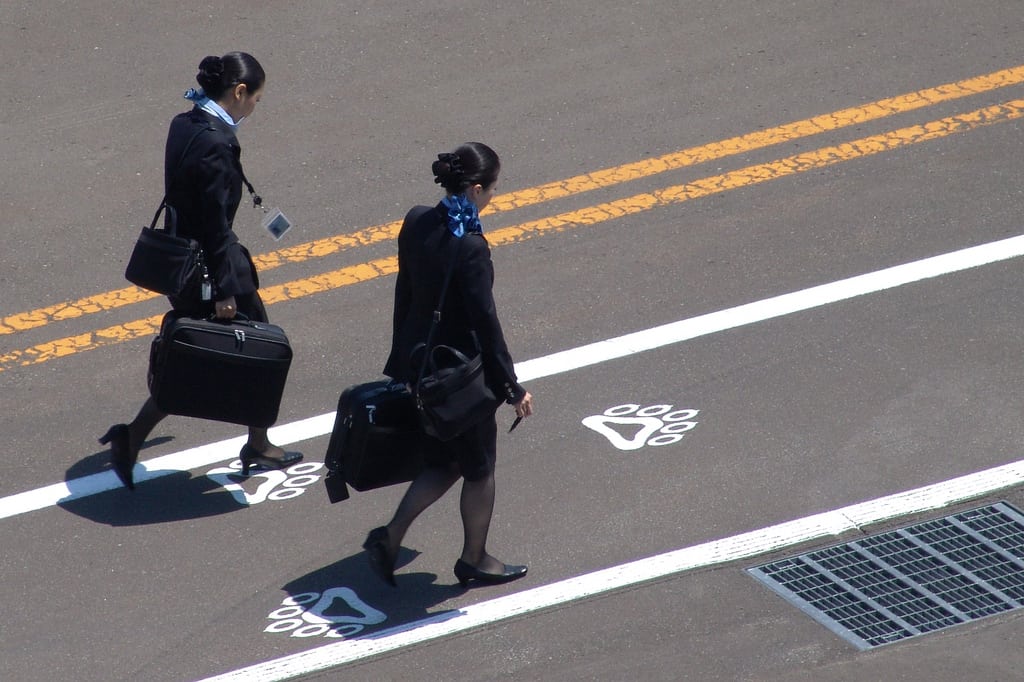5 ways flight delays are even worse for flight attendants than passengers

Skift Take
When the weather turns bad, the flight cancellations can quickly pile up.
For the tens of thousands of travelers stranded or delayed, it’s a lousy experience that seems to have no end. But we know it isn’t any better for the pilots and crews scheduled to work the grounded aircraft. To get some perspective on the matter, we turned to Heather Poole, our favorite flight attendant/writer, for some insight on why exactly it’s so lousy for them. — Jason Clampet
You think you’ve got it bad?
Passengers aren’t the only ones suffering when a storm hits town and causes the airports to close. Here’s what happens when flight attendants get grounded.
We don’t get paid
Flight attendants are paid for flying time only. Time on the ground doesn’t count. I’ve been working as a flight attendant with a major carrier for 17 years and from time to time I’ll work an 11 hour day and only get paid for five of those hours. Happens all the time to more junior flight attendants.
How?
All that time between flights goes unpaid. The flight attendant greeting you at the boarding door is not getting paid. Neither is the flight attendant helping you find a spot for your bag. The time clock doesn’t officially start ticking until the airplane backs away from the gate. Needless to say delays and cancellations affect flight attendants just as much, maybe even more so, than passengers.
We can be reassigned to work for days
Once we’re on a trip, we’re at the company’s beck and call until we die or the weather clears up. When airlines are low on staffing, they can reassign us to work different flights as long as we’re legal. The FAA allows us to work a 16-hour duty day, but we have to get at least eight hours behind a hotel door at the end of the day. Between trips we get 11-12 hours off, depending on if it’s a domestic or international route or whether or not we’re on reserve or holding “a line” (schedule).
After flying six days in a row, the FAA requires us to take a 24 hour break. These 24 hours don’t always take place at home. Sometimes they happen at an airport hotel. 25 hours later we could be right back up in the air. Which is tough because there’s just no way to let our families know when we might be home again.
We have no idea what to pack
There’s a reason why I was lounging around the pool in Miami wearing brown leather riding boots with turquoise running shorts for five days straight in October: Hurricane Sandy. This is why some of us might pack 30 pairs of pantyhose for a two-day trip when there’s a storm in the forecast, along with maybe, oh I don’t know, a pair of snow boots and a bikini.
Some flight attendants wouldn’t be caught dead without a small bottle of Woolite tucked inside their crew bag, and these same flight attendants usually have a very good story to tell. Sometimes it’s about an Ash Cloud. Other times it’s about a Mud Slide. On a beach or in the mountains, we just never know where we might end up.
We have to screen our calls
When flights are delayed or cancelled, flight attendants get stuck away from base. That, or they become illegal to work because they’ve been on duty for too many hours. If this happens “down line” (a city without reservists to pool from) you probably won’t be going anywhere anytime soon. Either airlines will push back the departure time or cancel the flight altogether.
When crews go illegal, airlines will assign trips to reservists, but if things get really bad they eventually run out of people to call. My airline can assign a trip to a flight attendant on a day off in an emergency weather type situation. If a flight attendant answers the phone, he or she can not refuse the trip. If they do, they’ll face disciplinary action.
Birthdays, anniversaries, recitals, it just doesn’t matter what they may have had going on on their day off. This is why some flight attendants update their Facebook pages with “DON’T ANSWER THE PHONE!” when a blocked number appears on the caller ID. We all know what that means. Sneaky crew schedulers are on the prowl.
We can’t get to work
Just because you see an airplane parked at the gate doesn’t mean you have a crew to work the flight. And just because you have a cockpit crew, doesn’t necessarily mean you’ll have flight attendants. We don’t stick together like that. Often we’re all just meeting each other for the first time; the pilots, the flight attendants, even the plane.
Now add commuters into the mix. Commuters are flight attendants who are based in one city but live in another. I’m a commuter. I’m based in New York, but I live in LA. Instead of driving to work, we fly to work.
No big deal in airline world, that is until we can’t get to work to cover a trip because all the flights are canceling or oversold. I’ve seen flight attendants come to blows over who’s next in line for the one and only jump seat on the last flight out. Either airlines kick off passengers off flights to get crews back to base or they cancel flights until the have enough flight attendants to work them. Usually they’ll cancel the flights. This is why it takes awhile for airlines to get things up and running after a storm passes through town.
Heather Poole works for a major US carrier. She’s also the author of the New York Times Bestseller, Cruising Attitude: Tales of Crashpads, Crew Drama, and Crazy Passengers at 35,000 Feet.
Skift’s in-depth reporting on climate issues is made possible through the financial support of Intrepid Travel. This backing allows Skift to bring you high-quality journalism on one of the most important topics facing our planet today. Intrepid is not involved in any decisions made by Skift’s editorial team.




